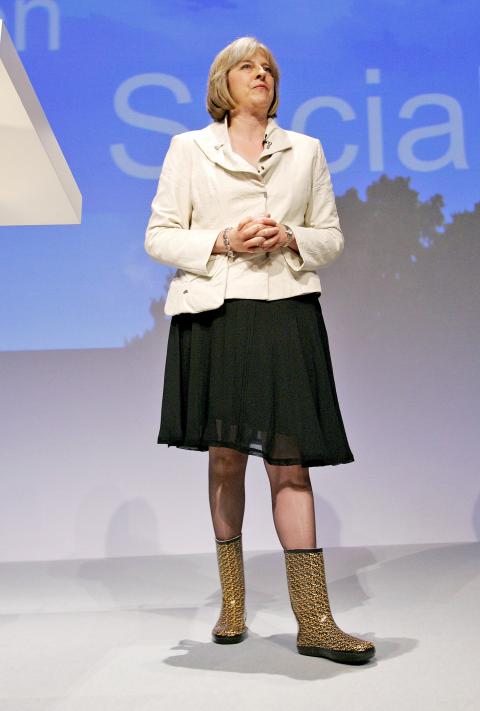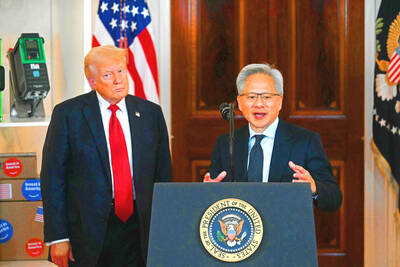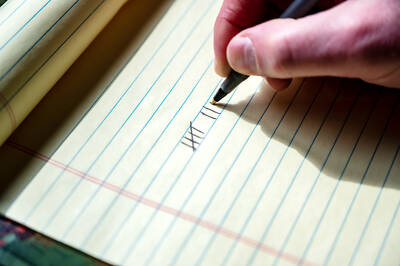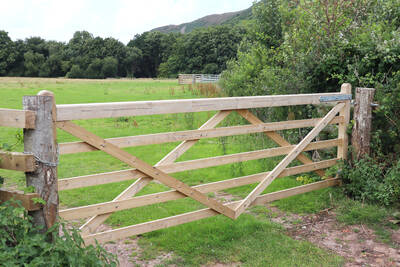We need to talk about clothing, and we may as well get the potentially embarrassing items out of the way first: what the Americans call underpants, British people call pants; what the Americans call pants, the Brits call trousers; what the Americans call suspenders, Brits call braces; what the Brits call suspenders, Americans call garter belts. Asking a British man whether he holds up his pants with suspenders could lead to confusion or mirth at best and fear at worst. Let’s be careful out there.
There are many differences in American English and British English about clothing and footwear, starting from the place in which they are kept: in British English, “wardrobe”; in American English, “closet.”
For formal wear, the British say dinner jacket, waistcoat and tie and, if it’s cold, one might wear a vest under the shirt. The Americans say tuxedo, vest and necktie and, if it’s cold, an undershirt under the shirt.

Photo: AP
照片:美聯社
In sports, the British will talk of a tracksuit and trainers; Americans will talk of their sweats and sneakers (or tennis shoes). If it’s cold out, the Brits might wear a jumper or jersey; the Americans a sweater.
If it’s wet out, the British may put on their Wellington boots (or “wellies”); the Americans might put on their galoshes or rubber boots.
And at home in the evening, a Brit might get into their pyjamas and put on a dressing gown; Americans might get into their pajamas and put a robe over them.
(Paul Cooper, Taipei Times)
我們要介紹服裝,乾脆就先來談談那些可能會讓人不好意思說出口的東西:美國人稱為「underpants」(內褲)的,英國人稱做「pants」;美國人稱「pants」(長褲)的,英國人稱為「trousers」;美國人說的「suspenders」(吊帶),是英國人所說的「brace」;但英國人所說的「suspenders」,美國人則稱為「garter belts」(吊襪帶)。如果問一個英國人說,他是不是「holds up his pants with suspenders」(用吊襪帶夾住長褲),最多只會令人困惑或引人發噱,最糟是會讓人害怕。我們還是謹慎為妙。
美式英文和英式英文對服裝和鞋子的稱呼有很多不同,就從放衣服的地方說起吧:英式英文稱做「wardrobe」(衣櫃)的,在美式英文中叫做「closet」。
稱正式服裝,英國人說「dinner jacket」(晚禮服)、「waistcoat」(背心)和「tie」(領帶),如果天氣冷,可以在襯衫裡面穿一件「vest」(背心)。美國人則是說「tuxedo」(小晚禮服)、「vest」(背心)和「necktie」(領帶),如果天冷,襯衫裡便加一件「undershirt」(汗衫)。
運動服裝方面,英國人說「tracksuit」(運動服)和「trainers」(運動鞋)。美國人則是說「sweats」(運動褲∕服)和「sneakers」(運動鞋),或「tennis shoes」(網球鞋)。如果外面天冷,英國人可穿上「jumper」(套頭衫)或「jersey」(針織衣);美國人則是穿「sweater」(毛衣)。
若外頭下雨,英國人可穿上「Wellington boots」(威靈頓靴,或稱「wellies」);美國人則是穿「galoshes」(防水套鞋)或「rubber boots」(橡膠靴)。
晚上在家,英國人會穿「pyjamas」(睡衣)和「dressing gown」(睡袍)。美國人則是穿「pajamas」(睡衣)、披上「robe」(長袍)。
(台北時報林俐凱譯)

When Nvidia CEO Jensen Huang revealed on Friday last week that the company is working with the Trump administration on a new computer chip designed for sale to China, it marked the latest chapter in a long-running debate over how the US should compete with China’s technological ambitions. The reasoning has sometimes changed — with US officials citing national security, human rights or purely economic competition — but the tool has been the same: export controls, or the threat of them. Nvidia believes it can eventually reap US$50 billion from artificial intelligence (AI) chip sales in China. But it so far has

Long before numerals and arithmetic systems developed, humans relied on tally marks to count. These simple, repeated marks — often just straight lines — are one of the earliest and most widespread methods of recording numbers. Archaeological findings suggest that humans began tallying in prehistoric times. During the Late Stone Age in Africa, humans began to carve notches onto bones to create tangible records of quantities. One of the earliest known examples is the Wolf bone, an artifact unearthed in Central Europe in 1937. This bone bears notches believed to be an early form of counting. Even more intriguing

Continued from yesterday(延續自昨日) https://www.taipeitimes.com/News/lang In many Western countries, the most common form of tally marks employs a five-bar gate structure: four vertical lines followed by a diagonal slash. To form this group, one begins by drawing four parallel vertical lines, each representing one. For the fifth, draw a diagonal line across the existing four. This diagonal stroke effectively creates a distinct group of five. To continue counting, just initiate a new cycle in the same manner. A set of five tallies combined with a single vertical line next to it represents the number six. Across many Asian countries, the Chinese character

In 2024, multiple airplane accidents caused severe casualties, including a Jeju Air disaster at the year’s end. However, not all incidents ended in tragedy. Early in the year, a Japan Airlines flight caught fire after landing in Tokyo, but all 379 passengers and crew members escaped within 90 seconds. This event highlights the “golden 90 seconds” that experts emphasize — most survivors evacuate the plane within this critical window. Proper preparation ensures you can act quickly and decisively during these crucial moments when every second counts. Your survival strategy begins before takeoff. Wear long pants, a comfortable top, and